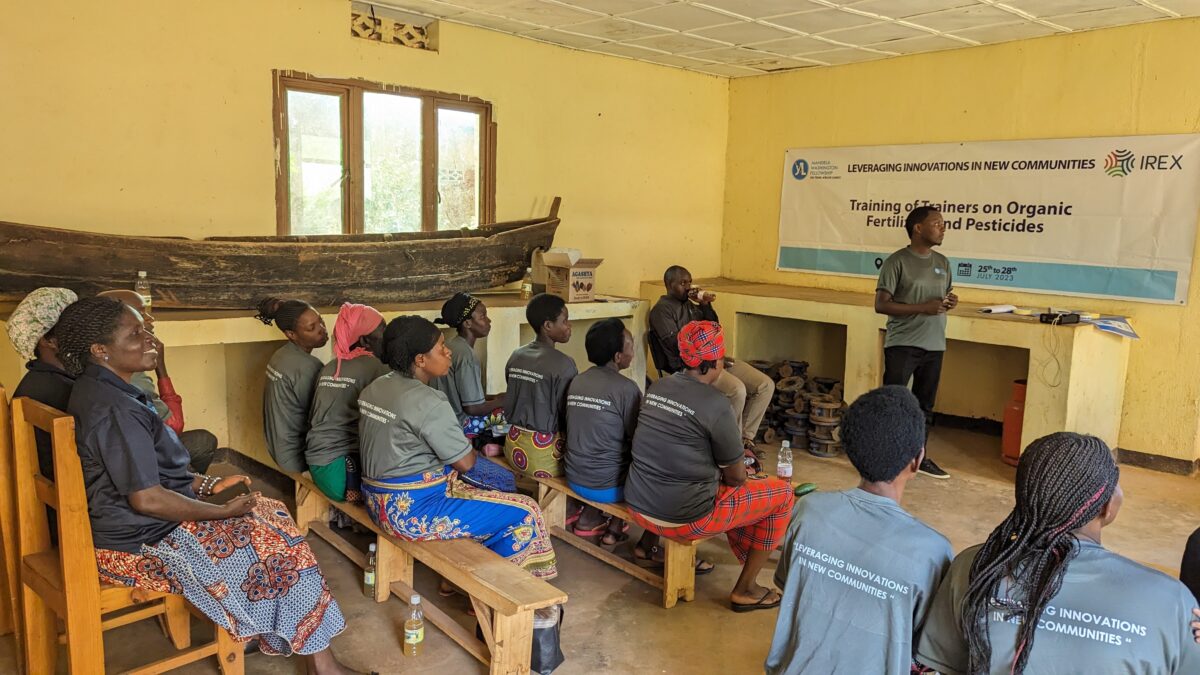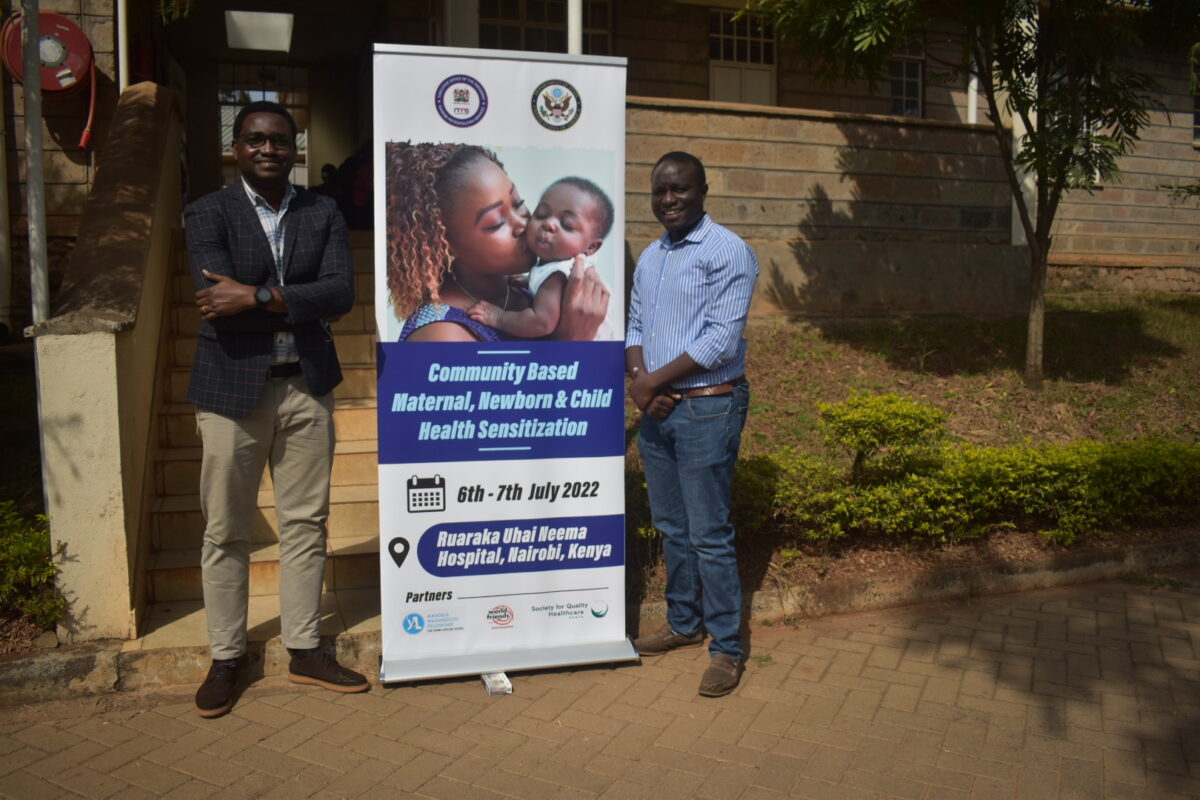Forty Alumni Selected as 2023 LINC Grant Recipients
The Mandela Washington Fellowship Alumni Team is delighted to announce the recipients of the 2023 Leveraging Innovations in New Communities (LINC) Grants! We received many inspiring proposals from Mandela Washington Fellowship Alumni, and funding has been awarded to support professional collaborations within the Fellowship’s Alumni Network.

Twenty (20) projects, each a collaboration between two Alumni, have been selected to receive 2023 LINC Grants. These collaborations allow Fellowship Alumni to engage in joint projects and learning experiences, either by traveling to each other’s countries or by collaborating virtually. The grants aim to foster valuable connections, encourage cross-country and cohort collaboration, and contribute to the growth and development of the Fellowship’s Alumni Network. Fellowship Alumni from all cohort years were eligible to apply for LINC Grants, with funding of up to $4,000 for in-person, or up to $2,700 for virtual or hybrid collaborations. This year’s LINC Grant proposals focused on seven key themes: Cultivating Economic Prosperity through Women’s Entrepreneurship, Fostering International Trade through Business Partnerships, Advancing Peace through Conflict Prevention and Reconciliation, Promoting Access to Quality Education, Innovating in Science and Technology, Promoting Inclusion through Disability Rights Advocacy, and Addressing the Impact of Climate Change.

Successful LINC collaborations from previous years exemplify the impact and potential of these projects:
- In 2021, Alumnae from Nigeria, Rwanda, and Uganda organized a virtual Disability Inclusion Convention, bringing together 280 disability rights activists from 27 countries to address inclusion challenges faced in Sub-Saharan Africa.
- 2017 and 2018 Alumni from Cameroon conducted workshops to teach women farmers innovative hydroponic farming techniques.
- In a 2019 hybrid workshop organized by a Gambian Alumna and a Nigerian Alumnus, deaf women were empowered with skills to promote financial self-reliance.
- 2016 and 2017 Alumni from Burkina Faso facilitated community trainings on peace and conflict resolution.
These examples serve as inspiration for the potential impact that the 2023 LINC Grant projects can achieve. We extend our congratulations to all the LINC Grant awardees, and appreciation to the Mandela Washington Fellowship Alumni for their commitment to innovation and collaboration!
Read more about their projects below.
Tamemeredzwa Chirewa, 2021 Alumna, Zimbabwe & Amos Kiyingi, 2021 Alumna, Uganda
The project in Uganda aims to provide a 5-day in-person training for 30 women aged 20-30 from Wakiso and Kampala. Targeting those without formal education but with vocational training, the training will cover personal development, leadership, and marketing. Participants will set business goals, develop plans, and receive tools for ongoing support. They will also be introduced to a business support group offering low-interest loans for startup grants.
Mohammed Kabir Ibrahim, 2016 Fellowship Alumnus, Nigeria & Binta Badjie, 2019 Alumna, The Gambia
This project incorporates hybrid and virtual workshops over four days involving ten deaf students and five STEM (Science, Technology, Engineering, and Mathematics) teachers from The Gambia and Nigeria, respectively. The in-person workshops will happen in The Gambia, providing contextual interpretation from American Sign Language to Gambian Sign Language for attendees. The goal is to address the lack of sign words for teaching STEM subjects in The Gambia, particularly in its Technical High School for the Deaf.
Khady Wade, 2022 Alumna, Senegal & Boubacar Mahmoud, 2022, Mauritania
The project is a two-week workshop that aims to help 20 poor women and adolescent girls become financially independent. They will learn about pitching, business planning, and accessing funding opportunities. The training empowers them to create employment opportunities for others, as well.
Paballo Dynah Mokoqo, 2017 Alumna, Lesotho & Trish Tatenda Hakata, 2019 Alumna, Zimbabwe
This collaboration aims to empower young female innovators in Zimbabwe through comprehensive entrepreneurship training. The program covers business planning, finance, branding, team development, and pitching. Participants will engage in two days of training, including group pitching sessions and mentorship opportunities. The collaboration seeks to economically advance female entrepreneurs and contribute to the socio-economic growth of Zimbabwe.
Moses Mwansa, 2021 Alumnus, Zambia & Tsholofelo Mokgoabone, 2022 Alumna, Botswana
This pilot project aims to train 50 women from savings clubs in business management, financial literacy, and digital tools usage. The training will equip participants with skills to improve their fiscal management and business operations, with the goal of transferring these skills to others.
Chibuzor Charles Agomuoh, 2018 Alumnus, Nigeria & Précieux Guénolé Rajaofera, 2019 Alumnus, Madagascar
The 2023 Anti-Youth Violence Project in Calabar seeks to reduce communal violence and engage civil society organizations. It involves educating 400 young students about the consequences of violence through a documentary and conflict management sessions. The project promotes peace and conflict resolution in communities, including the inclusion of a school for the Deaf & Mute from Calabar.
Gloria Anderson, 2021 Alumna, Tanzania & Alfred Odhiambo, 2021 Alumnus, Kenya
The collaboration aims to support the establishment of computer labs in schools in Tanzania and start community micro-libraries in Kenya. They expect to directly reach 500 individuals and indirectly impact 10,000 people in both countries. This project will enhance educational opportunities and access to information for students, promoting digital literacy and community engagement.
Abdallah Mabrouk, 2021 Alumnus, Tanzania & Aincha Aboubakar Oumadi, 2021 Alumna, Comoros
The goal of the project is to introduce efficient onion storage technology and train onion farmers in Good Agricultural Practices. The project targets 50 farmers, and the team lead will supervise manufacturing storage units in their presence. This initiative aims to reduce post-harvest losses, enhance productivity, and encourage agribusiness among onion farmers in Comoros.
Angella Kyomugisha, 2021 Alumna, Uganda & Brendah Nantongo, 2019 Alumna, Uganda
This collaboration is a virtual, inclusive agricultural skills workshop for 20 youth and hard of hearing women in Mbale, Uganda with the aim of combatting the financial challenges caused by the recent Ebola pandemic and lockdown. The two-week workshop will teach modern agricultural techniques for financial independence. Participants will receive certificates upon completion and be encouraged share their newly acquired skills to other youth and hard of hearing women virtually until Uganda is declared Ebola-free by the Ministry of Health.
Xangamira Sitoe, 2021 Alumna, Mozambique & Simon Nyaga Wanjiru, 2021 Alumnus, Kenya
The collaboration focuses on empowering women and youth with disabilities in food systems. The project will directly impact 50 individuals aged 18-60 by providing training on farming techniques, crop management, post-harvest practices, digital marketing, and market linkages. The participants will also engage with the agriculture and trade departments from Mozambique to address challenges in accessing resources and opportunities.
Ester Magano Hango, 2021 Alumna, Namibia & Hilda Amushembe, 2017 Alumna, Namibia
This collaboration aims to assist 40 rural youth, including unemployed youth, through a one-day youth camp in Okatyali, Namibia. The event will focus on demonstrating best practices to reduce the impact of climate change and promote business innovation by leveraging digital skills and renewable energy. Motivational speeches by Mandela Washington Fellows will also be part of the program.
Camus Mahougnon Adoligbe, 2016 Alumnus, Benin & Abdoulaye Diallo, 2016 Alumnus, Guinea
This project targets community members involved in poultry and agriculture, particularly those who use antibiotics. The goal is to raise awareness about antibiotic resistance and zoonosis, impacting 30 direct participants, including 5 women in Kindia Prefecture, Guinea. Through group educational sessions and radio campaigns, the project will address topics such as preventive measures against zoonosis, precautions for consuming animal products, actions in case of animal disease, the importance of vaccination, and the adverse consequences of excessive antibiotic use in animal agriculture. The aim is to promote public health and responsible practices among the target audience.
Fernando Bamba, 2022 Alumnus, Democratic Republic of Congo (DRC) & Patrick Mugiraneza, 2017 Alumnus, Rwanda
This collaboration aims to empower women farmers in Eastern Rwanda by addressing challenges related to organic farming practices, international certifications, high input costs, and marketing skills. The project includes a 4-day in-person Training of Trainers workshop for 30 participants from two cooperatives. These trained participants will then share their knowledge with around 1,500 farmers. The focus is on practical skills in organic fertilizer and pesticide production, compliance with certifications, and improving crop marketability. Additionally, the collaboration aims to foster business partnerships with women farmers in the DRC to enhance international trade opportunities for smallholder farmers in Rwanda and the DRC.
Racheal Inegbedion, 2021 Alumna, Nigeria & Toussaint Buunda Farini, 2021 Alumnus, Malawi
The collaboration aims to produce a documentary that explores the experiences and challenges faced by people living with disabilities in Nigeria and the Dzaleka refugee camp. The project involves collaborating with individuals living with disabilities, disability rights organizations, and refugee advocacy groups to ensure their voices and perspectives are represented and heard in this powerful documentary. The collaboration aims to inspire empathy, understanding, and positive societal change towards people with disabilities and refugees.
Sepenica Anfumwaa Darko, 2021 Alumna, Ghana & Murtala Labaran Gariba, 2021 Alumnus, Ghana
The collaboration aims to establish connections and gain permission for project activities in the Jimbale community. The focus is on training 200 smallholder farmers in Village Savings and Loan Association (VSLA). The training will equip farmers with skills for proper financial record-keeping, accessing investment opportunities, and establishing bank partnerships.
Neema Kihwelo, 2019 Alumna, Tanzania & Katlego Mokgethi, 2022 Alumna, Botswana
This project aims to empower young women to start and grow their social enterprises. Collaboration between the two Alumni will play a key role in supporting ecosystem development by training partner organizations in improving their business models and market potential. Young women will receive in-person training, coaching, and mentorship.
Uwayezu Janvier, 2017 Alumnus, Rwanda & Kolawole Temitope Olaniyi, 2017 Alumnus, Nigeria
The project aims to educate 30 University of Rwanda and 30 secondary school students through workshops on climate change mitigation and adaptation. The focus is on carbon markets and their potential to fund climate policies, particularly in Sub-Saharan Africa. The project also includes training on sustainable and conservation farming to equip students with knowledge and skills to address climate change challenges and promote sustainable practices.
Chipampa Chola, 2021 Alumnus, Zambia & Lilly Clara Musaya, 2021 Alumna, Malawi
The collaboration aims to train a youth cooperative in Kitwe, Zambia, on soybean production and marketing. Through a one-day workshop, 25 young people will learn about the technical aspects of soybean seed production. They will receive three days of practical field training and a one-day visit to a successful soybean farm. The goal is for youth to grow soybean seeds supply them to markets in Malawi or Zambia, promoting local agriculture and entrepreneurship.
Eugene Masinde, 2017 Alumnus, Kenya & Stanley Mburu, 2022 Alumnus, Kenya
The collaboration between Stanley Gitau and Eugene focuses on the Big Kuku X ‘GPT Mashinani’ pilot project. It aims to provide accessible guidance on poultry production practices for rural poultry farmers in Kenya. Activities include site visits, consultation with design partners, and rolling out the pilot product to a group of farmers. The project utilizes USSD (Unstructured Supplementary Service Data) technology and ChatGPT integration to deliver tailored advice. The goal is to promote sustainable and profitable agricultural practices, benefiting rural communities in Kenya.
Lydie Mukasekuru, 2016 Alumna, Rwanda & Golden Maunganidze, 2016 Alumnus, Zimbabwe
The collaboration aims to introduce the concept of peace journalism to 15 journalists and editors based in Lubumbashi, Democratic Republic of the Congo. The training will focus on accurate reporting of conflict situations, highlighting conflict origins and suggesting practical solutions. Participants from various media platforms will be selected for the training, followed by engagement discussions with media houses. The goal is to impart peace journalism skills, contributing to conflict resolution and peace-building efforts in the DRC.
Next Story
Oluwafunke Adeoye
2023 Fellowship Alumna, Nigeria